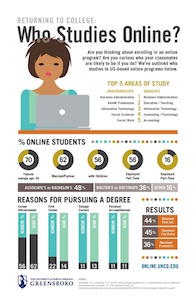Lifestyle
Finding the right balance between your school and other responsibilities will help you succeed in both. We all have busy lives. Part of living your ideal life is planning your schedule and setting priorities. If you enroll in online classes, you might find yourself overwhelmed by your responsibilities unless you manage your time.
To help you figure out if online coursework fits your lifestyle, take a look at the following sections on staying motivated and engaged in your online courses, setting up an environment conducive to learning, and methods for managing your life.
NOTE: Click the triangle to expand and collapse the content.
Motivation
Knowing your motives for taking an online course is an important actor in determining if going online is the best option. Your motives will drive your goals and help keep you on track as you complete your coursework.
Motives to Go Online
Have you ever thought about why you want to take online classes? Check out some of the more common motives for taking online courses below by clicking through the tabs. Do your own motives align with one or more of the following?
Activity: Check your motives
Staying Motivated
Many online students and instructors agree that a key to success in online learning is staying motivated. In a traditional classroom you show up to class at a set time and place. You talk to your instructor and classmates face-to-face in real-time. In an online class, however, you set the time and the place to participate, and most of your interactions with your instructor and classmates are asynchronous (i.e., not in real-time).
Be aware. The absence of the traditional classroom constants can trigger motivation loss, which can make it difficult to complete your coursework, leading to poor performance and even withdrawal from the course entirely. So you must be prepared to keep yourself motivated to do the work.
Strategies
- Set Goals. Keep your motives for enrolling in an online course or program at the front of your mind as you complete your course work. Set small, attainable goals for each class to avoid getting discouraged and overwhelmed. Keep track of your goals by writing them on sticky notes and placing them around your home. And remember, small successes will help lead to your ultimate goal.
- Create a Schedule. Develop a plan to stay on task so you can complete your coursework while still allowing time to enjoy the things you like to do. Schedule set times to log in to your course and to study, create reminders of due dates on your calendar or phone, and build in ample breaks to give your mind some time to take in what you’re learning. Having a plan will increase your likelihood of success and will help you reach your goals.
- Get Social. When you take online classes, you won’t see your classmates or instructor face-to-face. To avoid feeling isolated, make it a habit to interact with your peers and instructors through instant message, email, Google Hangouts, discussions forums, or by phone. Doing so will help keep your spirits high and help you develop a level of accountability to your coursework.
- Share Knowledge. Talk about your coursework with friends and family. Make connections to what you’re learning in your personal and work life. Sharing your knowledge with others can help you develop a sense of pride and accomplishment.
- Stay Healthy. Taking care of your mental and physical health can help your academic performance. As you build out your schedule, try to work in regular exercise, healthy meals, and plenty of rest and relaxation. If you’re not sure where to begin, contact your school’s respective recreation or counseling centers.
- Reward Yourself. Everyone deserves a pat on the back every now and again. As you complete your coursework, take time to recognize your achievements, whether you’ve finished a really boring textbook chapter or totally rocked an exam. Reveling in your accomplishments and taking breaks will help you keep a positive attitude and stay motivated.
Learning Space
You will be attending classes and completing your coursework online in your home, at a library, coffee shop, office, or other place with Internet, away from a physical classroom. To ensure you can learn and study effectively effectively, you’ll need to set up a learning space that is conducive to learning.
Setting up Your Learning Space
Location. Location. Location.
 While it’s tempting to set up your learning space wherever you want (after all, you’re learning online), you’ll benefit from a space that is quiet, comfortable, and roomy enough for your computer and study materials (textbook, papers, notepad, etc). You’ll also want to make sure your space has outlets for your computing devices and high-speed Internet access that can handle the demands of your online courses. For example, a quiet spot in your home or at your local library may work better than a table at your local coffee shop.
While it’s tempting to set up your learning space wherever you want (after all, you’re learning online), you’ll benefit from a space that is quiet, comfortable, and roomy enough for your computer and study materials (textbook, papers, notepad, etc). You’ll also want to make sure your space has outlets for your computing devices and high-speed Internet access that can handle the demands of your online courses. For example, a quiet spot in your home or at your local library may work better than a table at your local coffee shop.
Ensure adequate lighting
When you pick your learning space, be sure to choose one that has adequate overhead lighting or natural light. If there’s not enough light, you’ll have a hard time reading, which can cause eye strain and lead to fatigue.
Minimize distractions
Life is full of distractions and competing priorities. It may be difficult (or nearly impossible) to eliminate them all. However, you should deal with the distractions you can control so you can focus on coursework without interruptions. Turn off your phone, disable notifications, put away the game console, and let your friends, family, and roommates know that you’re going into study mode. The more you can prevent interruptions, the better you’ll focus on your studies.
Organize your space
Keep your learning space and course materials organized and free of clutter. Develop an organizational system that helps you find what you need when you need it. For example, hit up a local thrift store for a file cabinet or desk, organize your materials in folders, and store them in a drawer for easy access. Bottom line, figure out what works best for you and stick with it.
Set your schedule
One advantage of online learning is that you can set your own schedule. Whether you prefer to work in the morning or late at night, arrange your schedule to accommodate your preferences. Just be aware of what’s going on in and around your learning space so you can minimize distractions and competing priorities.
Time Management
Effective time management is one of the biggest challenges in college academic success. Manage your time wisely, prioritize your to-do list, anticipate future needs, make commitments, be punctual, and carry out plans. These habits will reduce the anxiety that can complicate your academic and social life. Effective time management improves grades, lowers stress, and holds you accountable for your responsibilities.
Overcoming Fears
Several fears can prevent students from effectively managing their time. Procrastination leads to missed appointments and missed deadlines. To avoid the academic and social setbacks procrastination causes, understand the fears that make you procrastinate in the first place. Here are four of the most common. Can you relate to any or all of these?

Where Does the Time Go?
We only have 168 hours available each week. You should be using eight hours to sleep each night, and you’ll most likely be averaging three hours every day preparing and eating meals. That leaves 91 hours for the week. You’ll spend some of that time in class, possibly some of it working, and some as free time. Of course you want to make time for family, exercise, and other activities.
Saving Time for Studying: The three-hour rule
Of the 168 hours in a week, how many do you devote to studying? On average, you should study 3 hours each week for every 1 credit hour that you are enrolled. For example, if you are enrolled in 12 credit hours, you should spend at minimum 36 hours each week studying. During those 36 hours, you should commit to reading assignments, writing papers, communicating with your classmates and instructor, working on projects, and preparing for quizzes and tests.
Prioritize: One activity at a time
It’s important to develop a system that tracks everything you need to do. By prioritizing tasks, you can make sure you complete everything before it’s due. Here are things to keep in mind as you sort activities into what needs to be done now and what can wait.
- Balance Your Activities. Don’t place everything on your immediate to-do list. But don’t put everything off until the end of the month either.
- Now vs. Later. Recognize what tasks are the most urgent based upon your commitments and responsibilities. Look ahead at future assignments to see what they involve.
- Me vs. We. Identify tasks that rely on other people, such as group projects. Be considerate of their time and yours by setting draft due dates before the final project due date. This gives you time to review your peers’ work and edit yours.
- Easy, then Hard. If possible, list and complete your easiest tasks first so that you feel a sense of accomplishment.
- Time on Task. Assess how long each task will take to complete.
- Most Important vs. Least Important. What are the consequences of not doing this activity? Tackle activities that have more consequences before other activities which have lesser consequences.
Falling Behind: Dos and Don’ts
It happens. When you juggle work, family, school and more, sometimes school gets neglected. If you fall behind and realize you are minutes away from the due date for an assignment you haven’t even started, contact your instructor. Be honest and explain the situation. Ask for an extension. Sometimes instructors will give you one, even if they take off a few points for being late.
- Don’t blame it on technology. Instructors have heard “My computer died” and “I couldn’t open the file” too many times to believe it. You aren’t the first to think of it. Be honest and move on.
- Don’t cheat. Some students copy others’ work when they are stressed, which is called “panic-cheating.” You can get a zero on your work or even expelled for violating the Academic Integrity Policy. It isn’t worth it.
- Don’t skip submitting the assignment. As they say, “Better late than never.” You can still learn from the assignment and get a passing grade, even if points are taken off for a late submission. If you don’t submit at all, you know you’ll get a zero, which could severely hurt your grade.
What you can do is learn from your experience and plan ahead so you aren’t caught in the same situation.
A Schedule that Sticks: Prioritize your life
It’s important to create a schedule tailored to your life’s activities. That means a personal calendar you follow each day. Above all, be consistent in filling out and checking your calendar. Here are some other important steps.

- Create a to-do list of your responsibilities and things you need to remember.
- Find a planner or calendar that fits your personality. Digital calendars are great options.
- Write down all of the names, times, locations, and phone numbers of your appointments, important events, and due dates for assignments, exams, quizzes, projects, work schedule, engagements, and other obligations. At the beginning of the semester, use your syllabus and course calendar to write down all due dates in your planner.
- Review your calendar daily so that you are up-to-date with your tasks.
- Always carry your planner or calendar with you in a convenient place.
Advice and Tips for Sticking to Your Schedule
Tips to maximize each hour
- Pick an electronic or physical planner that matches your style and use it daily.
- While commuting, read or listen to class lectures.
- While getting ready in the morning, make a mental list of things you need to do that day.
- Study, work on papers, and do research for projects between classes.
- Review class notes, or read, during your lunch break.
- Make daily or weekly to-do lists.
- Plan ahead to bring printouts of your readings or your textbook with you when you know you will have down-time.
- Subscribe to discussion forums on your phone so you can read them throughout the day when you are available.
Tips for studying effectively
- Always anticipate the good that will come from finishing a task on time, or early.
- Divide big tasks into smaller parts or steps.
- Break up marathon cramming sessions into short, focused study periods.
- Eliminate distractions during planned study time. Turn off the TV, radio, and iPod.
- Develop an agreement with your family or roommates about quiet hours.
- Promise yourself a reward for finishing a task.
- Avoid taking on more than you can handle.
- Learn to say no. Saying no frees up time for the things that are most important in your life. Don’t feel bad; you have a right to decline requests.
Activity: Personal Time Evaluation
Evaluate your schedule
As you may have guessed, a common theme of this module is creating a calendar to keep you motivated and on task. That said, you need to effectively plan and manage your week to ensure you have time to study. Take a moment to see how your current schedule fits in with online courses by completing the following Personal Time Evaluation.

